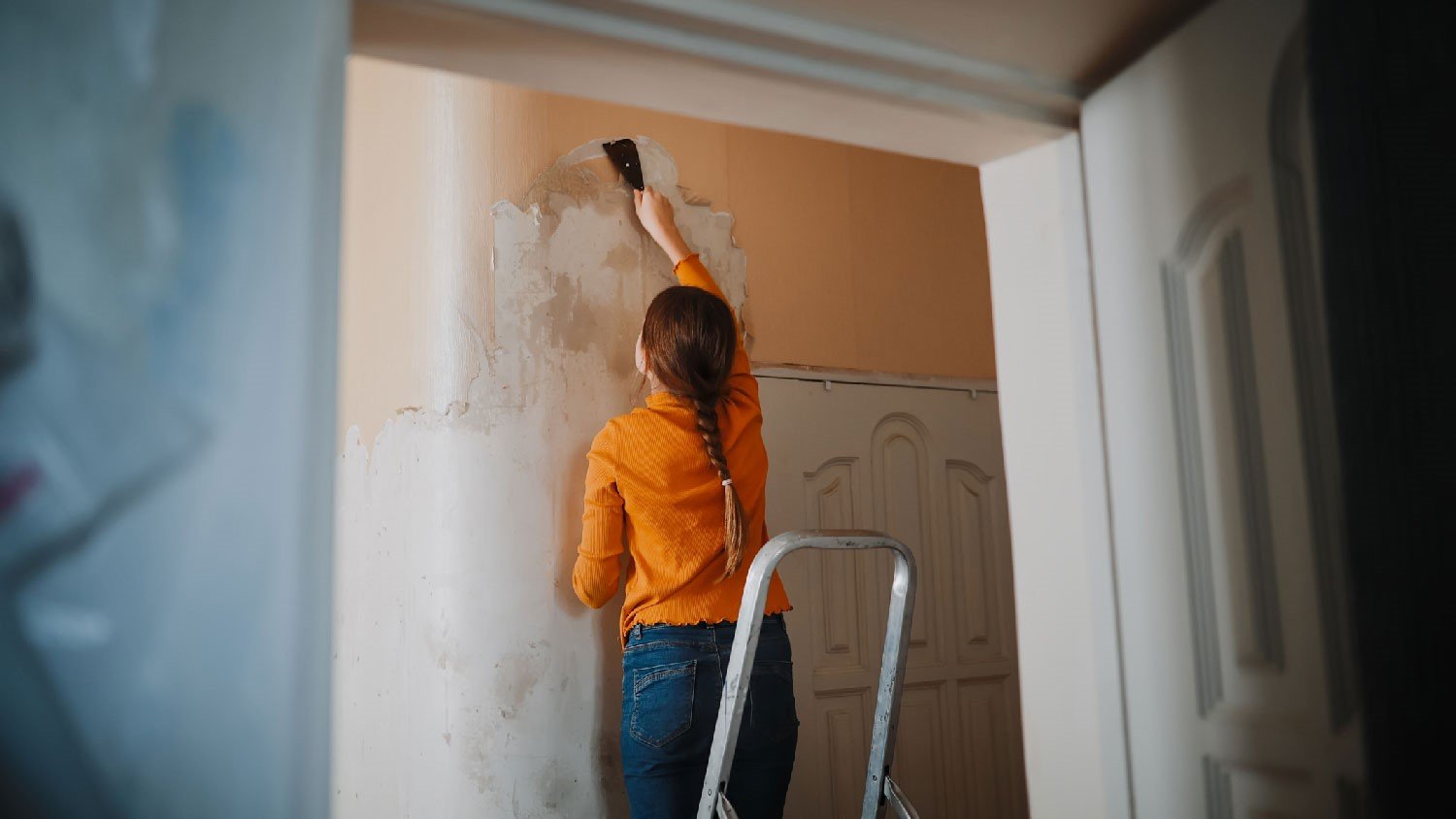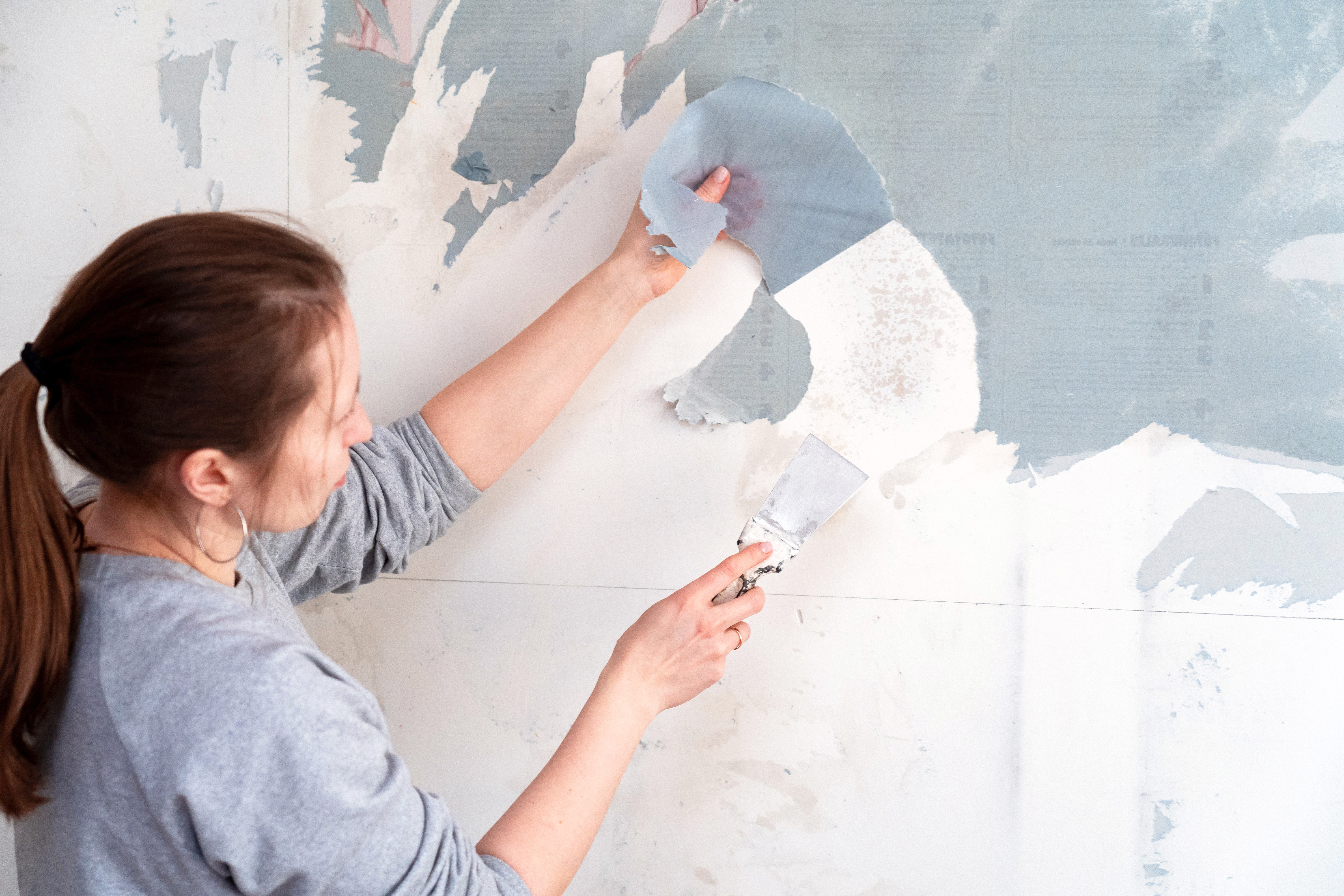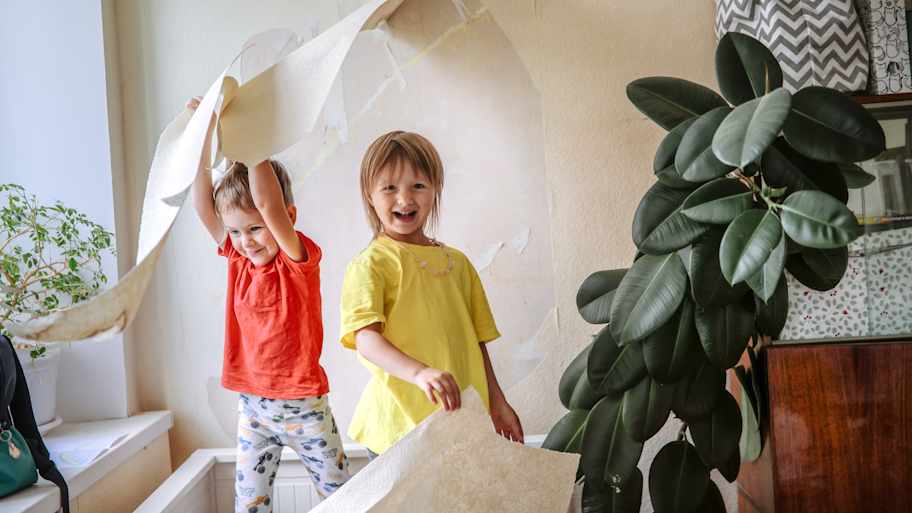
The paper is off, but your walls need some love. Learn how to repair your walls after a wallpaper removal project and prep them for paint or new decor.
Wallpaper removal costs depend on your project and location. Check with a local pro for your specific job.
Expect to pay between $0.60 and $3 for professional wallpaper removal.
Professional removal costs $40 to $80 per hour or $0.60 to $3 per square foot in labor.
Wall repairs after removal can add $100 to $1,000 to overall project costs.
Disposal fees for old wallpaper and adhesive can be $50 to $150 in additional costs.
This article was created using automation technology and thoroughly fact-checked and edited by an Angi Editor in accordance with our AI policy.
On average, wallpaper removal costs range from $422 to $1,192, with an average price of $792, depending on wall size, wallpaper type, removal method, and labor rates. Homeowners can expect to pay $0.60 to $3 per square foot for professional wallpaper removal. Factors like wall condition and prep work can affect the final price.
Removing old wallpaper is an important step for updating your space, ensuring new paint or décor goes on smoothly. Let’s explore what influences cost, options for DIY and professional removal, and ways to keep your project on budget.
Several factors influence wallpaper removal cost, from the type of wallpaper and method used to the overall size of your project. Understanding these details helps you plan and avoid surprises.
Different wallpaper types require different removal techniques, which directly impact the total cost. Vinyl, fabric, paper, peel-and-stick, and painted-over wallpapers each present unique challenges. For example, nonporous types (such as vinyl and multi-layered wallpapers) are harder to remove and take more time, increasing labor costs. Porous wallpaper (such as paper or fabric) and peel-and-stick wallpaper are faster and less costly to remove.
| Wallpaper Type | Average Cost per Sq. Ft. |
|---|---|
| Porous | $1–$2 |
| Nonporous | $1.50–$2.50 |
| Peel-and-stick | $0.75–$1.50 |
The size of your project is a major driver of wallpaper removal cost, with an average removal cost of $0.60 to $3 per square foot. Most professionals charge by the square foot, so a larger room or multiple rooms will increase the total price. Even small jobs often have minimum service fees.
| Room Size | Square Footage | Average Cost |
|---|---|---|
| Small bathroom | 50 | $30–$150 |
| Bedroom | 200 | $120–$600 |
| Living room | 400 | $240–$1,200 |
| Whole house | 1,000+ | $600–$3,000+ |
Minimum fees can apply if you only need a small area stripped, so it’s wise to ask about these when requesting quotes.
The type of wallpaper you have will inform the best removal method for your project. Each method has its own associated complexity and cost.
| Method | Average Cost per Sq. Ft. |
|---|---|
| Stripping | $0.60–$1.50 |
| Steaming | $1–$3 |
| Soaking and scraping | $1–$2 |
Wallpaper also works best in lower-traffic rooms that don’t get very much moisture. Rooms like kitchens and bathrooms are not ideal for wallpaper since those are considered high-moisture areas and can cause the paper to peel.
Labor is the largest part of your wallpaper removal cost. Painters, handypersons, and wallpaper specialists all offer this service, with rates varying by skill, complexity, and region. Expect to pay $40 to $80 per hour or $0.60 to $3 per square foot for labor.
Labor costs increase if your walls have multiple wallpaper layers, stubborn adhesives, or need repairs. Minimum charges apply for small projects, and rates can be higher in areas with a higher cost of living. More complicated jobs—like those with high ceilings or intricate trim—take longer and cost more.
Proper preparation is essential and can add to your wallpaper removal cost. This includes moving furniture, covering floors, and protecting trim or fixtures. Prepping also involves inspecting walls for damage and making minor repairs before work begins.
Masking, taping, and ensuring good ventilation are important for both safety and cleanliness. After the wallpaper is removed, debris must be disposed of properly, which some pros include in their service and others charge for separately.
Tipping is appreciated but not always expected for wallpaper removal. If your crew goes above and beyond—finishing early, handling extra repairs, or leaving your space spotless—a tip of 10% to 20% of the total cost or $20 to $50 per worker is a thoughtful gesture. For small jobs, a flat tip is often appropriate.
Several other factors can increase your wallpaper removal cost:
Wall repairs after removal, such as patching holes, sanding, or priming, can add $100 to $1,000.
If mold or water damage is uncovered, mold remediation costs may range from $500 to $2,300.
Disposal fees for old wallpaper and adhesive can be $50 to $150 if not included.
High ceilings, stairwells, or hard-to-reach areas require extra equipment or time, increasing labor costs.
Permit fees are rare but possible for large-scale or commercial projects.
Specialty finishes or prepping for decorative wall treatments after removal can raise the final bill.

Wallpaper removal does not have significant recurring costs, but some follow-up care is recommended to protect your investment.
After wallpaper removal, keeping your walls in good shape is important. Regular cleaning, minor touch-ups, and periodic inspections help maintain wall integrity. Priming and painting after removal cost $2 to $6 per square foot. Addressing small issues early prevents more costly repairs down the line.
There are no ongoing operating costs specific to wallpaper removal. However, if you use dehumidifiers or fans to dry walls, you’ll see a slight increase in utility bills. Running steamers for extended periods during removal can also add a small amount to your electricity use.
It’s common to need some wall repairs after removing wallpaper. Patching holes or cracks, sanding rough spots, and applying a skim coat for a smooth finish can cost $100 to $500 for minor work. Major repairs or extensive water damage may require professional help, raising costs to $1,000 or more. Small repairs are often manageable as a DIY project, but hire a pro if you’re unsure or lack the experience to tackle repairs on your own.
Homeowners’ insurance does not cover accidental wall damage during wallpaper removal if you’re doing the work yourself. If you hire a contractor, verify that they have liability insurance to cover any accidental damage. Always request proof of insurance before work begins to protect your home and peace of mind.
Hiring a local wallpaper removal pro costs more upfront, but you benefit from faster results, less risk of wall damage, and a professional finish. Pros bring specialized equipment and experience, making the process smoother and often saving you money on repairs.
Removing wallpaper is an extensive project that requires specialized expertise. Here are some of the top reasons to work with a pro:
Wallpaper removal pros ensure walls, baseboard, light switches, and paneling aren’t damaged in the removal process.
They have the tools and materials needed to remove wallpaper safely and effectively from a variety of surfaces.
Working with a pro ensures your project is done accurately and without the need for costly repairs.
Bundling wallpaper removal with other services, such as resurfacing or painting, can save on overall design costs.
If you want to take on some aspects of the project yourself, here are a few DIY tasks that can help save time and labor costs:
Remove objects from the wall, including artwork, shelving, or light switch plates, before removal begins.
Work with an interior designer to finalize your design and interior finishes early on so you understand the entire scope of your project.
Move furniture away from the walls to avoid added costs at the beginning of the wallpaper removal project.
Wallpaper removal often reveals the need for additional services, which can increase your total project cost:
Priming and painting walls after removal: $2 to $6 per square foot
Texturing or refinishing walls for a new look: $1 to $4 per square foot
Disposal of wallpaper and adhesive debris: $50 to $150
Mold remediation: $500 to $2,300
Specialty wall finishes or treatments: $2 to $5 per square foot
Discuss any potential add-ons with your contractor before work begins to get a clear sense of your full project budget.
There are practical ways to keep your wallpaper removal cost as low as possible:
Get multiple quotes from local wallpaper removal professionals to compare pricing and services.
Prepare the room yourself by moving furniture and covering floors.
Remove outlet covers and hardware before pros arrive.
Choose the right removal method for your wallpaper type to avoid damage.
Address minor wall repairs yourself if you feel confident.
Schedule removal during off-peak seasons for potential discounts.
Bundle wallpaper removal with painting or other wall services for savings.
Taking these steps can help you stay within budget and avoid unnecessary expenses.
Be ready to discuss with a pro what type of material your wallpaper is made of, as that may affect the tools they need.
If there is room left in your budget, ask your pro about add-ons like wall repair, painting, or resurfacing.
Be prepared for unexpected costs, such as damage repair or material price increases, that may arise during the removal process.
Home is the most important place on earth, which is why Angi has helped more than 150 million homeowners transform their houses into homes they adore. To help homeowners with their next project, Angi provides readers with the most accurate cost data and upholds strict editorial standards. We extensively research project costs to develop the pricing data you see, so you can make the best decisions for you and your home. We rely on reputable sources, including the U.S. Bureau of Labor Statistics, academic journals, market studies, and interviews with industry experts—all to ensure our prices reflect real-world projects.
Want to help us improve our cost data? Send us a recent project quote to [email protected]. Quotes and personal information will not be shared publicly.
From average costs to expert advice, get all the answers you need to get your job done.

The paper is off, but your walls need some love. Learn how to repair your walls after a wallpaper removal project and prep them for paint or new decor.

Wallpaper removal requires physical labor and can be a sticky mess. Consider these tips on the best ways to remove wallpaper to make the process as smooth as possible.

Wallpaper border can be difficult to remove. Learn five methods to remove wallpaper border effectively and without damaging your walls.

Whether you want to replace or remove your wallpaper, these handy tips for stripping wallpaper will make the process as easy as possible.

Taking down wallpaper is a tedious and time-consuming job. Here are some tips on how to hire someone to remove wallpaper for you to make your life easier.